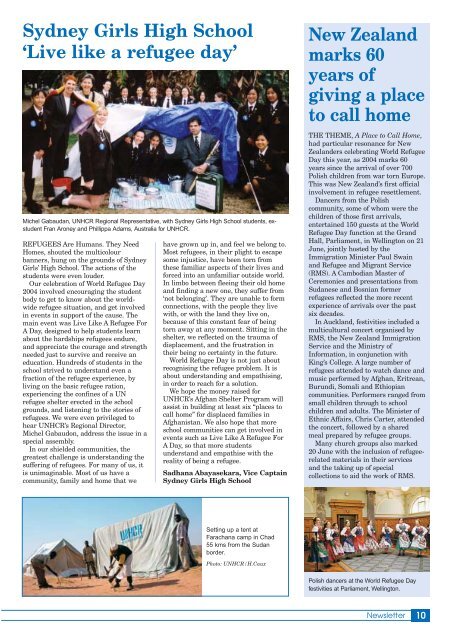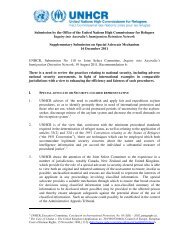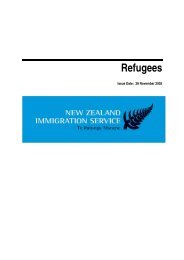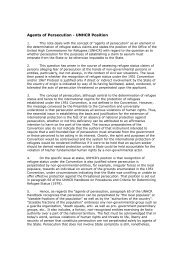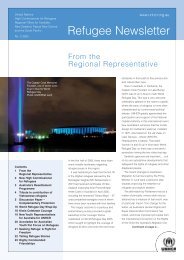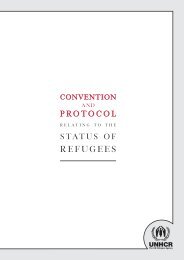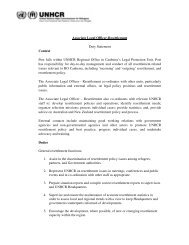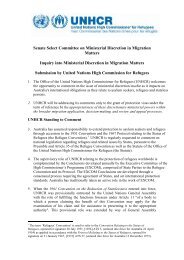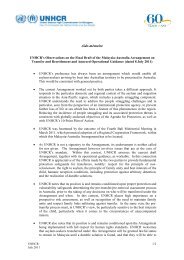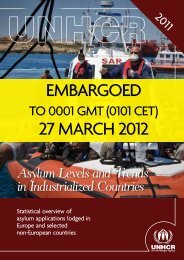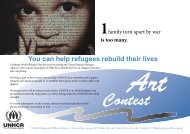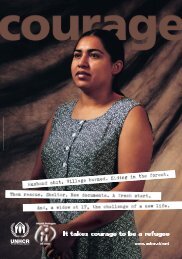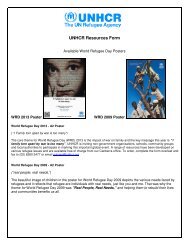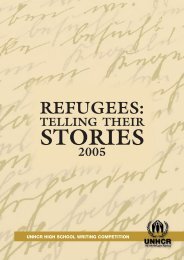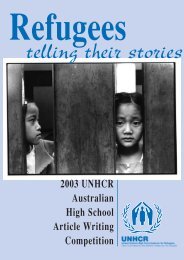download newsletter - unhcr
download newsletter - unhcr
download newsletter - unhcr
You also want an ePaper? Increase the reach of your titles
YUMPU automatically turns print PDFs into web optimized ePapers that Google loves.
Sydney Girls High School<br />
‘Live like a refugee day’<br />
Michel Gabaudan, UNHCR Regional Representative, with Sydney Girls High School students, exstudent<br />
Fran Aroney and Phillippa Adams, Australia for UNHCR.<br />
REFUGEES Are Humans. They Need<br />
Homes, shouted the multicolour<br />
banners, hung on the grounds of Sydney<br />
Girls’ High School. The actions of the<br />
students were even louder.<br />
Our celebration of World Refugee Day<br />
2004 involved encouraging the student<br />
body to get to know about the worldwide<br />
refugee situation, and get involved<br />
in events in support of the cause. The<br />
main event was Live Like A Refugee For<br />
A Day, designed to help students learn<br />
about the hardships refugees endure,<br />
and appreciate the courage and strength<br />
needed just to survive and receive an<br />
education. Hundreds of students in the<br />
school strived to understand even a<br />
fraction of the refugee experience, by<br />
living on the basic refugee ration,<br />
experiencing the confines of a UN<br />
refugee shelter erected in the school<br />
grounds, and listening to the stories of<br />
refugees. We were even privileged to<br />
hear UNHCR’s Regional Director,<br />
Michel Gabaudon, address the issue in a<br />
special assembly.<br />
In our shielded communities, the<br />
greatest challenge is understanding the<br />
suffering of refugees. For many of us, it<br />
is unimaginable. Most of us have a<br />
community, family and home that we<br />
have grown up in, and feel we belong to.<br />
Most refugees, in their plight to escape<br />
some injustice, have been torn from<br />
these familiar aspects of their lives and<br />
forced into an unfamiliar outside world.<br />
In limbo between fleeing their old home<br />
and finding a new one, they suffer from<br />
‘not belonging’. They are unable to form<br />
connections, with the people they live<br />
with, or with the land they live on,<br />
because of this constant fear of being<br />
torn away at any moment. Sitting in the<br />
shelter, we reflected on the trauma of<br />
displacement, and the frustration in<br />
their being no certainty in the future.<br />
World Refugee Day is not just about<br />
recognising the refugee problem. It is<br />
about understanding and empathising,<br />
in order to reach for a solution.<br />
We hope the money raised for<br />
UNHCR’s Afghan Shelter Program will<br />
assist in building at least six “places to<br />
call home” for displaced families in<br />
Afghanistan. We also hope that more<br />
school communities can get involved in<br />
events such as Live Like A Refugee For<br />
A Day, so that more students<br />
understand and empathise with the<br />
reality of being a refugee.<br />
Sadhana Abayasekara, Vice Captain<br />
Sydney Girls High School<br />
New Zealand<br />
marks 60<br />
years of<br />
giving a place<br />
to call home<br />
THE THEME, A Place to Call Home,<br />
had particular resonance for New<br />
Zealanders celebrating World Refugee<br />
Day this year, as 2004 marks 60<br />
years since the arrival of over 700<br />
Polish children from war torn Europe.<br />
This was New Zealand’s first official<br />
involvement in refugee resettlement.<br />
Dancers from the Polish<br />
community, some of whom were the<br />
children of those first arrivals,<br />
entertained 150 guests at the World<br />
Refugee Day function at the Grand<br />
Hall, Parliament, in Wellington on 21<br />
June, jointly hosted by the<br />
Immigration Minister Paul Swain<br />
and Refugee and Migrant Service<br />
(RMS). A Cambodian Master of<br />
Ceremonies and presentations from<br />
Sudanese and Bosnian former<br />
refugees reflected the more recent<br />
experience of arrivals over the past<br />
six decades.<br />
In Auckland, festivities included a<br />
multicultural concert organised by<br />
RMS, the New Zealand Immigration<br />
Service and the Ministry of<br />
Information, in conjunction with<br />
King’s College. A large number of<br />
refugees attended to watch dance and<br />
music performed by Afghan, Eritrean,<br />
Burundi, Somali and Ethiopian<br />
communities. Performers ranged from<br />
small children through to school<br />
children and adults. The Minister of<br />
Ethnic Affairs, Chris Carter, attended<br />
the concert, followed by a shared<br />
meal prepared by refugee groups.<br />
Many church groups also marked<br />
20 June with the inclusion of refugeerelated<br />
materials in their services<br />
and the taking up of special<br />
collections to aid the work of RMS.<br />
Setting up a tent at<br />
Farachana camp in Chad<br />
55 kms from the Sudan<br />
border.<br />
Photo: UNHCR/H.Caux<br />
Polish dancers at the World Refugee Day<br />
festivities at Parliament, Wellington.<br />
Newsletter<br />
10


